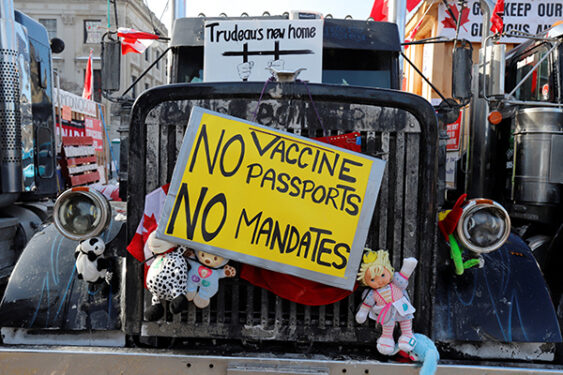
NEW YORK — When protestors first clogged the streets of Ottawa, Canada with heavy trucks about three weeks ago, Msgr. Kevin Beach had to cancel a funeral — because the hearse couldn’t get in front of St. Peter Basilica.
A week later, he canceled Sunday Masses. Last week he changed Mass hours and attendance was limited, a situation he anticipates will continue this weekend.
As the fourth weekend of protests approaches, Msgr. Beach said life in the Canadian capital has been disrupted long enough.
“Not forgetting of course that as Canadians we certainly value freedom of speech, freedom of assembly as that might be expressed in legal protests. But what is happening now in our city is in fact illegal because we’re preventing people from circulating in the streets, business people from opening their businesses, working people going to work, and also, of course, parishioners not being able to get to church, or they’re afraid to go to church because of harassment and intimidation that’s happening in our streets,” Msgr. Beach, the rector of St. Peter Basilica, told The Tablet.
Called the “Freedom Convoy,” the protests began in Ottawa to push back against a COVID-19 vaccine mandate Prime Minister Justin Trudeau put in place for truckers crossing the U.S.-Canada border. The protests have since spread across the country and focused more broadly on COVID-19 vaccine mandates and restrictions in general. Ottawa police on Tuesday, Feb. 15, said there were about 360 vehicles parked in the downtown core of Ottawa.
The police gave protestors written notice on Feb. 16 that they had to leave or face criminal charges. The notice to demonstrators highlights that “the people of Ottawa are being denied the lawful use, enjoyment, and operation of their property and you are causing businesses to close,” which it adds “is mischief under the Criminal Code.”
The notice to demonstrators also mentions that under the federal Emergencies Act anyone who travels to Ottawa to join the demonstration is breaking the law, and police have the ability to seize vehicles part of the demonstrations among other additional powers.
The Emergencies Act was invoked by Prime Minister Justin Trudeau earlier this week that gives enormous, temporary, power to the federal government to deal with a crisis. It’s the first time the Emergencies Act has been used by a Canadian government since it was passed as a replacement for the War Measures Act in 1988. The War Measures Act had been last used in 1970.
People have questioned whether Trudeau’s invocation of the Emergencies Act was justified. Trudeau has also been criticized for his vow to use the act to freeze protesters’ bank accounts, and some of his rhetoric to describe largely peaceful protestors.
“Some of the prime minister’s early interventions were not helpful and I think in many respects hardened the position of the protestors,” Msgr. Beach said. “I think there could have been a more conciliatory tone, even as what they were doing is illegal.”
Msgr. Beach has had a front-row seat to the protests at St. Peter Basilica, which is on Kent Street only a few blocks away from Ottawa’s Parliament Hill. Msgr. Beach said other than the protesters’ trucks being illegally parked and blocking the streets, they’ve been “respectful and well behaved.” He said that he’s spoken with the “block captain,” or central organizer of the area, who’s been “reasonable,” and apologized when they learned the funeral was canceled. They also said they’ll try to accommodate a memorial Mass and wedding this weekend, Msgr. Beach noted.
However, Msgr. Beach added there are outside groups that come on the weekend, people he calls “on the fringes” who are “taking advantage of the situation to push their own issue or be lawless.”
Through it all, Msgr. Beach’s focus remains on fostering unity in the parish between people on both sides of the issue. He said unity begins with people centering the conversation around faith.
“I think what we need to do is certainly as Catholics be aware of our faith, which calls us to unity and to reconciliation, and to forgiveness where it’s required,” Msgr. Beach said. “We have to get behind us all of the issues that divide us and look to the issues that unite us, which as Catholics is our faith. We have to find our source of unity there and follow Jesus Christ.”
Father Geoffrey Kerslake, a spokesman for Archbishop Marcel Damphousse of Ottawa-Cornwall, told The Tablet that the archbishop has also received correspondence from people on both sides of the vaccine debate, as well as people advocating for and against vaccine passports.
Archbishop Damphousse encourages people to get COVID-19 vaccinations “for their sake and for the sake of the healthcare system,” but hasn’t and doesn’t have plans to impose any sort of mandate to attend Mass or other liturgies. He believes the decision “must be freely made,” according to Father Kerslake.
On the disagreements people have over COVID-19 regulations, Father Kerslake noted that all everyone wants is to return to life as normal as soon as possible. Therefore, he said, people need to listen.
“There are disagreements about the best means to achieve that goal and we need to be patient with one another, really listening to each other’s experience, fear, anxieties, and hopes, praying with and for each other, asking for healing, strength, and hope from God as we move through this challenging time together,” Father Kerslake said.
